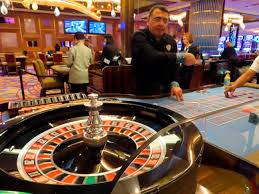 Rahul Sharma
Rahul Sharma
In recent years, live dealer roulette has transformed from a niche online feature into one of the fastest-growing segments of the U.S. gambling market. Combining the authenticity of a traditional casino with the convenience of digital access, this hybrid experience has struck a chord with American players. As online gambling continues to expand across the country, live dealer roulette is poised to play a central role in shaping the future of gaming in the United States. With the growth of technology, state regulations, and changing player habits, the rise of live dealer roulette is no longer just an industry prediction—it’s a reality taking shape before our eyes.***What Makes Live Dealer Roulette SpecialUnlike standard online roulette powered by random number generators (RNG), live dealer roulette uses real tables, real wheels, and human dealers broadcast through high-definition video streams. Players can place bets on their devices while watching the dealer spin the wheel in real time. This blend of trust, transparency, and interactivity creates a far more engaging experience than purely digital versions, helping it attract both newcomers and seasoned gamblers. For many, the feeling of watching the ball land on a number live removes the skepticism that sometimes surrounds digital-only casino games. In the U.S., where players value transparency and fairness, this trust factor has been a major reason for its rapid adoption.Live dealer roulette also offers a human connection that’s missing in standard online formats. Players can chat with the dealer, celebrate wins alongside others at the table, and feel the excitement of a communal atmosphere, all while sitting in their living rooms. This interaction blends the excitement of Las Vegas with the comfort of home—a combination that makes it highly appealing in a country where convenience and entertainment often go hand in hand.***Expansion Through LegalizationOne of the biggest factors driving the future of live dealer roulette in the USA is the ongoing legalization of online gambling. States like New Jersey, Michigan, and Pennsylvania already offer live dealer games through licensed platforms, while others such as New York, Illinois, and California are actively debating the expansion of online casino regulation. The Supreme Court’s landmark 2018 ruling that allowed states to regulate sports betting also opened the door to broader gambling legislation. With tax revenues and job creation on the line, more states are expected to embrace online gambling, and live dealer roulette will be among the top offerings.The American gambling landscape is unique because it’s regulated state by state rather than federally. This means the pace of adoption varies, but it also creates opportunities for competition among states. As each state works to attract gamblers, live dealer roulette—being both popular and profitable—is quickly becoming a standard feature. The legalization trend indicates that in the next decade, live dealer roulette will be available to the majority of Americans, not just those living in gambling-friendly states.***Technology Driving Immersive PlayTechnology is at the heart of why live dealer roulette is so compelling and why it will dominate the future. 5G connectivity ensures smooth streaming with no lag, even on mobile devices. Ultra-HD cameras placed at different angles provide immersive views of the wheel, dealer, and betting area. Players can switch between camera perspectives to customize their experience, making it feel closer to an in-person casino game. In addition, multi-table functionality allows players to watch and participate in more than one game simultaneously, maximizing engagement.Looking further ahead, the integration of virtual reality (VR) and augmented reality (AR) will take live dealer roulette to unprecedented levels. Imagine putting on a VR headset and entering a digital replica of a Las Vegas casino, walking up to a roulette table, and interacting with a live dealer as though you’re physically present. AR could overlay roulette tables onto real-world environments, turning a coffee table in your home into a gaming table. These immersive technologies are no longer science fiction—they are already being tested in pilot programs by leading U.S. casino operators.***The Role of Trust and TransparencyTrust remains one of the strongest selling points for live dealer roulette in the U.S. market. Unlike RNG-based games, which some skeptics suspect of being manipulated, live dealer roulette shows every spin, every ball drop, and every outcome in real time. This transparency builds confidence among players who may otherwise hesitate to gamble online. Licensed U.S. platforms also add another layer of security by being regulated, audited, and required to maintain fairness. In an era where online scams are prevalent, trust is perhaps the most valuable currency for digital casinos, and live dealer roulette capitalizes on it effectively.Transparency also benefits casinos. By providing visible, fair gameplay, operators can attract and retain customers who may have previously stuck to land-based casinos. This assurance of fairness strengthens brand loyalty and helps U.S. operators compete against unregulated offshore platforms.***Appeal to a New Generation of PlayersYounger American gamblers, particularly Millennials and Gen Z, are driving the shift in gambling trends. They tend to prefer games that are interactive, social, and tech-driven rather than traditional slot machines. Live dealer roulette caters perfectly to these preferences. Features such as real-time chat with dealers, interactive betting interfaces, and multiplayer tables allow for a shared experience, much like gaming or streaming platforms that younger players already use.This demographic also values flexibility. Being able to play on mobile devices during commutes, on tablets at home, or even while traveling makes live dealer roulette ideal. In fact, studies show that more than 70% of online gambling in the U.S. is now done via mobile devices, making live dealer formats even more crucial to the future. By combining social interaction, convenience, and high-quality visuals, live dealer roulette aligns perfectly with the expectations of America’s younger gamblers.***The Impact of COVID-19 on Live Dealer GamesThe COVID-19 pandemic played an unexpected role in accelerating the adoption of live dealer roulette in the USA. With casinos closed and people confined to their homes, online gambling became the only option for many players. During this period, live dealer roulette surged in popularity because it provided the closest experience to being in a real casino. Even after restrictions lifted, many players continued to prefer live dealer games, having discovered the convenience and thrill they offered. This cultural shift solidified live dealer roulette as a permanent fixture in the American gambling scene.***Economic Impact and Casino Industry ShiftsThe rise of live dealer roulette also has economic implications. Online casinos offering live dealer games generate significant revenue, contributing to state taxes and creating new jobs in technology, customer service, and broadcasting. Studios hosting live dealer games in states like New Jersey and Michigan employ hundreds of dealers, camera operators, and support staff. As more states legalize online gambling, the industry will expand further, boosting local economies while reshaping the casino workforce.Interestingly, live dealer roulette is also changing the way physical casinos operate. Many land-based casinos are now investing in hybrid experiences, where players can participate in live dealer games from lounges or hotel rooms within the casino property itself. This integration ensures that live dealer formats complement rather than replace physical casinos, creating a win-win situation for the industry.***Future OutlookThe future of live dealer roulette in the USA is incredibly promising. The combination of legal expansion, technological innovation, and shifting player preferences makes it one of the most dynamic areas of the gambling industry. In the next five to ten years, we can expect to see nationwide legalization, VR and AR-powered experiences, and even greater personalization options for players. AI may soon be used to tailor roulette sessions to individual preferences, offering customized table limits, dealer styles, and promotional offers.In addition, live dealer roulette will likely evolve into a more entertainment-driven format. Just as Twitch and YouTube transformed video gaming into a spectator sport, live dealer roulette may attract audiences who enjoy watching streams without necessarily betting themselves. This could lead to crossover with social media platforms, influencers hosting live roulette nights, and a blending of gambling with mainstream entertainment.***ConclusionLive dealer roulette has already proven itself as more than just a trend—it’s a revolution in how Americans gamble online. With its unique mix of authenticity, technology, and social interaction, it bridges the gap between the traditional casino floor and the digital world. Legalization across states, combined with innovation in streaming, VR, and mobile gaming, ensures that it will only grow stronger. As the industry evolves, live dealer roulette will remain at the heart of U.S. gaming, offering not just a game of chance but an experience that embodies the future of entertainment. For American players, the little wheel continues to spin—but now, it spins in living rooms, on mobile devices, and in virtual spaces across the nation.At over two centuries old, roulette has never lost its charm. Yet, in the form of live dealer roulette, it has found new life in the American digital age. It is not just surviving the shift to online platforms—it is thriving. The fusion of tradition and innovation makes live dealer roulette a symbol of the gambling industry’s future in the USA. Its story is still unfolding, but one thing is certain: the wheel will keep spinning, and American players will keep watching with anticipation.
By Rahul Sharma · 07 Oct 2025

The legalization of online gambling in the United States has been a complex and evolving process, and roulette sits at the heart of this transformation. Once associated solely with glamorous casino floors in Las Vegas or Atlantic City, roulette has made its way into the digital world, where millions of Americans now access it through licensed online casinos. But is online roulette actually legal in the United States? The answer depends on where you live. Gambling laws are determined at the state level, creating a patchwork of regulations that range from fully legal and regulated to completely prohibited. This article explores the legal status of online roulette in the U.S., breaking it down state by state while highlighting the broader regulatory trends shaping the industry.***The Federal vs. State DynamicAt the federal level, online gambling has historically been restricted by laws such as the Unlawful Internet Gambling Enforcement Act (UIGEA) of 2006, which limited financial institutions from processing online gambling transactions. However, this law did not outright ban online gambling—it simply left enforcement to the states. The U.S. Supreme Court’s landmark 2018 decision to strike down the Professional and Amateur Sports Protection Act (PASPA) further empowered states to make their own choices about online gambling, paving the way for online roulette to grow in legal markets.***States Where Online Roulette is LegalCurrently, only a handful of states have legalized and regulated online casino gaming, including roulette. These states are the leaders of the digital gambling movement, offering safe, secure, and licensed platforms for players.***New JerseyNew Jersey has been the pioneer of online gambling in the United States since 2013. The state’s Division of Gaming Enforcement (DGE) oversees all online casino operations, and players can access a wide variety of roulette games, including both American and European versions. New Jersey’s robust legal framework has made it a model for other states considering online gambling legislation.***PennsylvaniaPennsylvania followed New Jersey’s example by legalizing online casinos in 2017. Since then, the Pennsylvania Gaming Control Board has licensed multiple operators, and roulette has become one of the most popular games in the state. The strong tax revenues generated from online roulette and other casino games have demonstrated the economic potential of legalization.***MichiganMichigan legalized online gambling in 2019 and officially launched its online casinos in 2021. Roulette quickly became a favorite among players, especially in its live dealer form. The Michigan Gaming Control Board regulates operators and enforces strict guidelines to ensure fairness and security.***DelawareDelaware was actually the first state to legalize online gambling back in 2012. The state’s small population means its market is limited, but online roulette is available through state-operated platforms. Delaware continues to collaborate with other states to expand its online gaming presence.***ConnecticutConnecticut joined the online gambling market in 2021, allowing licensed tribal casinos to operate digital platforms. Roulette is widely available to residents, and the state has quickly seen strong participation rates. This demonstrates how even smaller states can successfully integrate online roulette into their gaming economy.***West VirginiaWest Virginia legalized online casinos in 2019, and roulette has been a part of the state’s offerings since launch. With a regulatory framework similar to New Jersey and Pennsylvania, the state provides players with a safe and fair gaming environment.***States Considering LegalizationSeveral states are currently debating whether to legalize online casinos, including roulette. These include New York, Illinois, and Indiana. Each state recognizes the potential tax revenue and consumer demand but faces political challenges and debates over problem gambling. Should these states move forward, the availability of online roulette in the United States could grow significantly in the coming years.***States Where Online Roulette is Not LegalIn most of the country, online roulette remains either unregulated or outright prohibited. States like California, Texas, Florida, and Georgia do not currently allow online casinos. However, residents often find ways to access offshore platforms, which operate in a legal gray area. While these sites may offer roulette games, they do not provide the same protections as licensed U.S. operators, creating risks for players.***Tribal Casinos and Online RouletteIn several states, tribal casinos play a major role in gambling. Some tribal operators have begun exploring online roulette under compacts with state governments. This model is particularly important in states like Connecticut and Michigan, where tribal gaming entities are central to the industry’s growth.***Responsible Gambling RegulationsIn states where online roulette is legal, regulators emphasize responsible gambling measures. Licensed platforms are required to offer deposit limits, time restrictions, and self-exclusion options. These protections reflect the broader trend in the U.S. toward ensuring that the rise of online roulette does not come at the expense of public health.***Economic Impact of Legal Online RouletteThe legalization of online roulette has already proven economically beneficial for states that have embraced it. New Jersey and Pennsylvania, for example, generate hundreds of millions in annual tax revenue from online casinos. This revenue supports public services such as education and infrastructure, creating an incentive for more states to legalize online gambling. The jobs created in tech, customer service, and regulatory compliance add further economic benefits.***Future OutlookThe future of online roulette in the United States is promising. As more states witness the success of pioneers like New Jersey and Michigan, the momentum for legalization will continue to build. The growth of mobile technology, live dealer innovations, and even virtual reality roulette tables will further drive demand. Over time, it is likely that a majority of states will regulate online roulette, creating a safer and more accessible gaming environment for millions of Americans.***ConclusionSo, is online roulette legal in the United States? The answer is both yes and no. It is fully legal and regulated in a handful of states, while in most others it remains unavailable or exists in a gray area. However, the trend is clear: the future of online roulette in the U.S. points toward greater legalization, broader access, and continued innovation. For now, American players must navigate this patchwork system, but the wheel is spinning toward nationwide acceptance of this iconic game in the digital era.
By Rahul Sharma · 02 Oct 2025

Casinos in the United States have grown from small entertainment venues into powerful engines of economic activity. By 2025, the casino industry has become an essential part of many state economies, driving job creation, tourism, tax revenues, and local development. While opinions on gambling vary, there is no denying that casinos play a major role in shaping the economic landscape of the U.S.***Job Creation and Employment OpportunitiesOne of the most direct economic benefits of casinos is employment. From dealers, waitstaff, and hotel managers to entertainers and security personnel, casinos employ tens of thousands of people across the country. In states like Nevada and New Jersey, casinos are among the largest private employers, offering steady jobs with competitive salaries. By 2025, the expansion of online and tribal casinos has also created opportunities in technology, marketing, and digital operations, broadening the scope of employment.***Boosting State Tax RevenuesCasinos generate billions in tax revenue for U.S. states every year. These funds are often directed toward public services such as education, infrastructure, and healthcare. For example, states like Pennsylvania and Michigan have used casino tax revenue to strengthen public school funding, while Nevada reinvests heavily into tourism promotion. In 2025, as more states legalize online gambling, digital casinos are becoming another important source of tax income, further fueling state budgets.***Tourism and Hospitality GrowthCasinos act as magnets for tourism, drawing visitors from around the world. Las Vegas remains the prime example, with millions of tourists visiting each year not only to gamble but also to enjoy concerts, dining, shopping, and nightlife. Atlantic City, Connecticut’s Mohegan Sun, and tribal casinos across the Midwest and Southwest have all transformed their regions into tourist hubs. By 2025, casinos have expanded beyond gaming to include luxury resorts, spas, and entertainment venues, making them multi-dimensional tourism drivers.***Local Business DevelopmentThe economic impact of casinos extends beyond the casino floor. Local restaurants, shops, and service providers often benefit from increased traffic generated by casino visitors. Construction companies, suppliers, and event planners are also tied to casino growth. In many states, casinos serve as anchors for broader economic development, encouraging investments in transportation, real estate, and hospitality.***The Role of Tribal CasinosTribal casinos have become especially influential in the U.S. economy. Since the passage of the Indian Gaming Regulatory Act in 1988, tribal casinos have provided economic empowerment to Native American communities. By 2025, many tribes operate large-scale casino resorts that generate billions in revenue, funding healthcare, housing, and education for tribal members. These casinos not only create jobs within Native communities but also contribute significantly to surrounding state economies.***Online Gambling and the Digital ShiftThe legalization of online gambling has added a new dimension to the casino economy. States like New Jersey, Pennsylvania, and Michigan have embraced digital platforms, creating new revenue streams. Online casinos provide jobs in technology, customer service, and software development, while also appealing to younger, tech-savvy players. By 2025, the digital casino market is estimated to be a multi-billion-dollar industry, complementing traditional land-based casinos rather than replacing them.***Challenges and Social CostsWhile casinos bring undeniable economic benefits, they also raise concerns. Critics point to issues like problem gambling, economic dependence on tourism, and increased competition that can hurt small businesses. Some regions worry about the volatility of casino revenue, particularly when economic downturns or global events affect tourism. States are increasingly investing in responsible gambling programs and regulatory measures to balance economic gains with social responsibility.***Regional Differences in ImpactThe economic impact of casinos varies significantly by state. In Nevada, the industry is central to the economy, accounting for a massive share of state revenues and employment. In contrast, states like Massachusetts or Ohio treat casinos as supplementary industries that support tourism and entertainment. Tribal casinos, meanwhile, serve as both community lifelines and regional economic engines. By 2025, the growth of casinos in states like Arkansas, Virginia, and Illinois has shown that even smaller markets can benefit significantly.***The Future OutlookLooking ahead, casinos in the U.S. are likely to expand further into digital spaces, luxury tourism, and integrated resort development. States that embrace innovation will continue to reap significant economic rewards. However, balancing economic growth with social responsibility will remain critical. As casinos adapt to new technology and changing demographics, their role in the U.S. economy will only become more complex and significant.***ConclusionThe economic impact of casinos on U.S. states is both vast and multifaceted. They provide jobs, generate tax revenue, fuel tourism, and support local businesses. Tribal casinos bring empowerment to Native communities, while online platforms are creating entirely new markets. Despite challenges and debates, casinos remain one of the most dynamic contributors to state economies. By 2025, their influence is undeniable, shaping not just the gaming industry but the broader economic fabric of the United States.
By Rahul Sharma · 08 Oct 2025

Casinos have long been a cornerstone of entertainment, risk, and reward in the United States. From riverboat gambling on the Mississippi to the dazzling lights of Las Vegas, the history of casinos in America is a fascinating tale of cultural evolution, legal battles, and economic impact. Each era shaped the industry differently, leaving behind a legacy that still influences how Americans gamble today.***Early Gambling in AmericaThe roots of American gambling date back to the 17th and 18th centuries when settlers brought European traditions to the New World. Lotteries were a common way to raise funds for public projects, while informal card games and betting activities spread across taverns and gatherings. By the early 19th century, gambling was a well-established pastime, though it carried both moral criticism and social acceptance depending on the region.***The Rise of Riverboat GamblingThe Mississippi River became a hub for gambling in the early 1800s. Riverboats carried wealthy travelers and traders who sought entertainment during long journeys. Poker, blackjack, and dice games were staples on these floating casinos. The rise of riverboat gambling contributed to the spread of casino culture in states like Louisiana and Mississippi, cementing gambling’s place in the American imagination.***The Wild West and Frontier GamblingBy the mid-19th century, gambling spread to frontier towns in the American West. Saloons in cities such as Deadwood, Dodge City, and San Francisco became famous for poker tables, roulette wheels, and card sharps. Gambling was a social centerpiece, but it was also notorious for attracting cheats, gunslingers, and law enforcement crackdowns. These Wild West saloons helped shape the enduring image of gambling as both risky and glamorous.***Las Vegas and the Legalization EraThe most transformative moment in U.S. casino history came in 1931 when Nevada legalized gambling. Las Vegas quickly became the epicenter of the American casino industry. Initially a small desert town, Las Vegas expanded rapidly with the help of mob investments, flashy hotels, and the introduction of neon-lit casino resorts. Games like blackjack, craps, and roulette dominated casino floors, while stage shows and luxury amenities attracted tourists from across the country.***The Influence of Organized CrimeDuring the mid-20th century, organized crime syndicates played a crucial role in shaping Las Vegas casinos. Mob bosses funded the construction of iconic casinos like The Flamingo, Sands, and Stardust. Their involvement added both glamour and controversy, as stories of skimming operations and underworld influence became part of Vegas lore. Eventually, federal crackdowns and corporate takeovers reduced mob influence, ushering in a new era of legitimacy.***Atlantic City Joins the SceneIn 1976, New Jersey legalized casino gambling in Atlantic City, making it the first U.S. city outside Nevada to host large-scale casinos. The opening of Resorts International in 1978 marked a new chapter in East Coast gaming. Atlantic City thrived as a tourist destination through the 1980s, though it later struggled with competition, economic decline, and the rise of other gambling markets. Still, it remains a key part of U.S. casino history.***The Tribal Casino BoomThe late 20th century saw another major shift with the rise of Native American casinos. Following the Indian Gaming Regulatory Act of 1988, tribal nations were able to operate casinos on sovereign land. This led to the establishment of successful casino enterprises like Foxwoods in Connecticut and Mohegan Sun. Tribal casinos revitalized local economies, created jobs, and established a new dimension in the U.S. gambling industry.***Modern Expansion Across the StatesToday, casinos exist in nearly every U.S. state, whether as commercial establishments or tribal operations. Riverboat casinos still operate in states like Louisiana and Illinois, while major hubs like Las Vegas and Atlantic City continue to attract millions of visitors each year. States such as Pennsylvania, Michigan, and Oklahoma have also emerged as major casino markets, proving that gambling has become a widespread American pastime.***The Online Casino RevolutionIn the 21st century, online casinos have added another layer to the history of gambling in the United States. While regulations vary by state, online poker, sports betting, and casino games are rapidly expanding. States like New Jersey, Michigan, and Pennsylvania lead the way in legal online gaming, offering players the convenience of gambling from home while preserving the excitement of traditional casinos.***Cultural Legacy of Casinos in the U.S.Casinos are more than just places to gamble—they are cultural landmarks that reflect the American spirit of risk, reward, and entertainment. They have influenced music, films, and television, becoming iconic backdrops for stories of fortune and fame. From Frank Sinatra’s performances in Las Vegas to Hollywood’s obsession with casino heists, the imagery of U.S. casinos continues to captivate the world.***ConclusionThe history of casinos in the United States is a story of evolution, resilience, and reinvention. From humble lotteries and riverboat poker tables to the neon paradise of Las Vegas and the digital frontier of online casinos, gambling has remained a defining feature of American culture. Casinos continue to represent both opportunity and entertainment, ensuring their place in U.S. history for generations to come.
By Rahul Sharma · 03 Oct 2025

Sports betting in the United States has undergone a seismic transformation over the past few years, and at the center of this revolution are mobile betting apps. Once confined to casinos and sportsbooks in places like Las Vegas, betting is now accessible to millions of Americans at the tap of a button. These apps have completely reshaped how people gamble, making betting faster, more convenient, and more engaging than ever before.***The Rise of Mobile Sports BettingThe 2018 Supreme Court decision to strike down PASPA opened the floodgates for legalized sports betting across the U.S. As states began regulating the market, mobile betting apps quickly emerged as the dominant platform. Companies like DraftKings, FanDuel, BetMGM, and Caesars Sportsbook capitalized on the opportunity, creating user-friendly apps that put entire sportsbooks in the palms of players’ hands.***Why Mobile Apps Are So PopularConvenience is the biggest driver of mobile betting’s success. Bettors no longer need to travel to a casino or retail sportsbook—they can place wagers from home, at a sports bar, or even inside stadiums. These apps offer a wide range of features, including real-time odds, live betting, cash-out options, and in-depth statistics. The ability to bet instantly while watching a game has turned casual fans into active participants.***Live Betting and In-Game ActionOne of the most significant innovations mobile betting apps have introduced is live betting. Fans can now place wagers as games unfold, predicting the next touchdown, the number of points in a quarter, or even the outcome of a single play. This has made watching sports far more interactive, as bettors stay engaged from start to finish. The dynamic nature of in-game wagering has fueled explosive growth in betting volume across the U.S.***Bonuses, Promotions, and CompetitionThe competitive nature of the U.S. sports betting market has led to aggressive promotions by betting apps. Welcome bonuses, risk-free bets, and deposit matches have become standard offerings to attract new customers. These incentives, combined with loyalty rewards and ongoing promotions, keep players coming back. For many users, the abundance of deals is one of the biggest perks of betting through mobile apps rather than traditional sportsbooks.***The Integration of Media and BettingSports networks and media companies have also jumped on the mobile betting trend. Many broadcasts now feature live odds and betting analysis, often provided directly by sportsbook partners. Apps integrate with fantasy sports platforms and streaming services, creating a seamless ecosystem where sports entertainment and betting coexist. This integration has blurred the line between watching a game and betting on it, fueling even greater engagement.***The Economic ImpactMobile betting apps have generated billions of dollars in revenue for operators and significant tax revenue for states. Cities with legal sports betting have seen tourism and casino activity increase, while local businesses benefit from fans gathering to watch and wager on games. The financial impact underscores why so many states have rushed to legalize and regulate mobile betting.***Challenges and ConcernsDespite the success, mobile betting apps face challenges. Problem gambling, underage betting, and concerns about data security remain pressing issues. Regulators and operators are working to promote responsible gaming through tools like deposit limits, self-exclusion programs, and awareness campaigns. High-profile controversies, including athletes suspended for betting violations, show the fine balance between expanding the industry and protecting its integrity.***The Future of Mobile Betting in the U.S.As technology continues to advance, mobile betting apps will only become more immersive. Expect innovations such as virtual reality sportsbooks, AI-powered betting recommendations, and even greater integration with live streaming. With more states moving toward legalization, the reach of mobile apps is set to expand even further, making them the centerpiece of the U.S. betting industry for years to come.***ConclusionMobile betting apps have not just changed the way Americans gamble—they’ve redefined it. By combining convenience, technology, and entertainment, these apps dominate the U.S. betting market and continue to grow at a rapid pace. From live betting innovations to economic benefits for states, their impact is undeniable. As legalization spreads and technology evolves, mobile betting apps will remain the driving force behind America’s gambling future.
By Rahul Sharma · 05 Oct 2025

Sports betting in the United States has experienced a dramatic transformation over the past century. Once relegated to smoky backrooms and illegal bookies, it is now a multi-billion-dollar industry operating in broad daylight. From prohibition to legalization, and from paper slips to mobile apps, the evolution of sports betting mirrors broader shifts in American culture, technology, and law.***Early Beginnings and Illegal BookmakingIn the early 20th century, sports betting in the U.S. was largely illegal but widely practiced. Horse racing was one of the few legal betting options, and tracks across the country attracted large crowds. However, betting on other sports like baseball, boxing, and football was often controlled by underground bookies, many of whom had ties to organized crime. These operations were risky for bettors and operators alike, as law enforcement regularly cracked down on illegal gambling rings.***The PASPA Era: Federal Ban on Sports BettingIn 1992, the federal government passed the Professional and Amateur Sports Protection Act (PASPA), effectively banning sports betting nationwide, with a few exceptions such as Nevada. For decades, Nevada remained the only state where legal sports betting flourished. Meanwhile, illegal sports betting continued to thrive through offshore websites and underground operations, showing that the demand never truly disappeared.***The Fall of PASPA and a New Era BeginsEverything changed in 2018 when the U.S. Supreme Court struck down PASPA in a landmark decision. This ruling allowed individual states to legalize and regulate sports betting within their borders. Almost overnight, states began passing legislation to open sportsbooks, both in-person and online. New Jersey, Pennsylvania, and Indiana were among the first to launch legal markets, quickly generating millions in revenue.***Rise of Mobile Betting PlatformsOne of the most significant developments in the evolution of sports betting has been the rise of mobile apps. Companies like DraftKings, FanDuel, BetMGM, and Caesars Sportsbook have made it easy for users to place bets on their phones from anywhere within a legal state. These platforms offer live betting, parlays, same-game bets, and real-time odds updates. Technology has made betting more accessible, faster, and more engaging than ever before.***Mainstream Acceptance and Cultural ShiftSports betting is no longer taboo. It is now openly discussed on major sports networks, integrated into pregame shows, and promoted by professional leagues themselves. The NFL, NBA, MLB, and NHL have all partnered with sportsbooks, signaling a major cultural shift. What was once considered a vice is now marketed as an entertaining part of the sports experience.***Economic Impact on States and CommunitiesLegal sports betting has generated billions in tax revenue for states. These funds have been used for education, infrastructure, public safety, and community programs. In states like New York and Illinois, sports betting revenue has exceeded expectations, prompting more states to explore legalization as a means of boosting their economies.***Responsible Gaming and RegulationWith the growth of legal betting comes the responsibility to protect consumers. States have implemented regulations to promote responsible gaming, including age verification, self-exclusion programs, deposit limits, and advertising restrictions. Operators are required to adhere to strict guidelines to ensure transparency, fairness, and player safety.***Challenges and Future OutlookDespite its rapid growth, the sports betting industry still faces challenges. Concerns about problem gambling, match-fixing, and underage access remain. There is also growing competition among sportsbooks, leading to aggressive marketing and promotional wars. However, with federal oversight unlikely and state markets continuing to expand, the future of sports betting in the U.S. looks strong.***ConclusionThe evolution of sports betting in the United States is a story of legalization, innovation, and changing public perception. From illegal bookies to state-regulated apps, the industry has undergone a complete transformation in just a few decades. Today, sports betting is an integral part of the American sports landscape, offering both entertainment and economic opportunity—while reminding us of the importance of responsible play.
By Rahul Sharma · 30 Sep 2025

Hitting a massive jackpot is a life-altering experience that can trigger a whirlwind of emotions. While the money itself often steals the spotlight, the psychology of jackpot winners reveals a much deeper story. From joy and relief to stress and anxiety, sudden fortune can reshape how people think, behave, and interact with the world. America’s biggest jackpot winners provide fascinating insights into how wealth can transform not only bank accounts but also minds and hearts.***The Initial Shock and EuphoriaThe first psychological reaction to a jackpot win is often shock, quickly followed by euphoria. Winners describe moments of disbelief, screaming, laughing, or even feeling numb. For many, the realization that years of financial worry are suddenly gone produces a profound emotional high. This immediate rush of adrenaline and dopamine is comparable to other peak life experiences, but with an added element of unreality—it feels like stepping into a dream.***The Burden of Sudden WealthWhile jackpot winners celebrate, the emotional weight of sudden wealth soon sets in. Psychologists note that rapid financial gain can trigger stress, paranoia, or even guilt. Winners may fear losing their fortune, mistrust friends and family, or worry about making the wrong financial choices. This psychological state is sometimes called "sudden wealth syndrome," a condition where the shock of rapid riches disrupts mental well-being. The pressure to manage money wisely can be overwhelming, especially for those without prior financial experience.***Changes in Identity and Self-PerceptionMoney often reshapes how people see themselves. Jackpot winners sometimes describe feeling more powerful, independent, and in control of their lives. Others, however, feel disconnected from their old selves, uncertain about how to fit into their new reality. Some hide their identity to avoid unwanted attention, while others embrace fame as part of their new role. This shift in self-perception reveals how deeply money influences personal identity, both positively and negatively.***The Social Ripple EffectSudden fortune doesn’t only affect winners—it also transforms relationships. Friends, family, and even strangers may start to treat winners differently. Some relationships grow stronger through shared generosity, while others strain under the weight of financial requests or jealousy. Psychologists emphasize that these social pressures can create feelings of isolation. Many jackpot winners report pulling back from old social circles to protect themselves, highlighting the complicated social psychology of wealth.***Fear of Loss and Risk-Taking BehaviorIronically, some jackpot winners develop intense fears of losing their money, while others become more reckless with risk-taking. A winner might become overly cautious, avoiding investments and hoarding cash. Others, fueled by the thrill of winning, chase riskier ventures, convinced their luck will continue. This psychological split demonstrates the different ways the human brain processes sudden fortune—either as something fragile that must be protected or as proof of invincibility.***Emotional Highs and LowsThe emotional journey of jackpot winners often resembles a rollercoaster. The high of winning eventually fades, replaced by everyday realities. Some report feelings of emptiness, depression, or disillusionment once the initial excitement wears off. The contrast between life before and after the jackpot can be jarring, especially if winners expected permanent happiness. Psychologists explain this as a “hedonic reset,” where people eventually return to their baseline level of happiness, regardless of financial gain.***Generosity and PurposeFor many winners, finding purpose in their fortune is a key to long-term happiness. Stories of jackpot winners donating to charities, funding scholarships, or helping family members reflect the positive psychological impact of generosity. Giving creates a sense of meaning and fulfillment that goes beyond personal luxury. Psychologists argue that channeling wealth into purposeful actions can prevent feelings of emptiness and provide a healthier emotional relationship with money.***Cautionary Tales and LessonsAmerica’s jackpot history is filled with cautionary tales of winners who lost everything due to poor financial management, addiction, or unhealthy relationships. These stories remind us that money amplifies existing behaviors—it doesn’t erase them. Winners who were disciplined before often thrive, while those who struggled with control sometimes spiral further. The psychological takeaway is clear: without preparation, sudden fortune can magnify life’s challenges rather than solve them.***What Jackpot Winners Teach Us About Human NatureUltimately, jackpot winners reveal fundamental truths about human psychology. Money provides freedom, but it does not guarantee happiness. Wealth changes circumstances, but not personality. The reactions of winners—ranging from joy to fear, generosity to isolation—mirror the complexities of human nature itself. Their stories teach us that while fortune can open doors, the way people walk through them depends on their mindset, values, and resilience.***ConclusionThe psychology of jackpot winners in America shows that sudden wealth is as much an emotional journey as it is a financial one. From the initial rush of euphoria to the challenges of identity, relationships, and purpose, these stories remind us that money is only part of the equation. True happiness comes from balance, perspective, and the ability to navigate fortune with wisdom. Jackpot winners may capture headlines for their millions, but their deeper lessons lie in how they handle the emotional weight of their new reality.
By Rahul Sharma · 04 Oct 2025